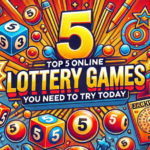In recent years, the world of gambling has undergone a significant transformation, largely driven by technology. Among the many innovations, online lotteries have emerged as a popular alternative to traditional lottery systems. Offering convenience, accessibility, and a wider range of games, online lotteries are redefining how players engage with chance and luck. This article delves into the evolution of online sis4d, their advantages, and the future of this burgeoning sector.
A Brief History of Lottery
Lotteries have a rich history, dating back thousands of years. The earliest known lottery was recorded in China during the Han Dynasty (205-187 BC), where it was used to fund major government projects. Over the centuries, lotteries evolved, becoming popular in Europe in the 15th century as a means to raise funds for various causes, including public works and charity.
With the advent of the internet in the late 20th century, lottery systems began to transition to online platforms. In 1994, the first online lottery was launched in Canada, paving the way for other jurisdictions to follow suit. Today, many countries around the world have embraced online lotteries, creating a global marketplace for players.
Advantages of Online Lottery
- Convenience and Accessibility: One of the most significant advantages of online lotteries is the convenience they offer. Players can participate from the comfort of their homes or on the go via mobile devices. This ease of access has broadened the player base, attracting younger demographics who may have previously avoided traditional lotteries.
- Variety of Games: Online lottery platforms often feature a wider range of games compared to physical outlets. Players can choose from traditional lotteries, instant win games, and even international lotteries, significantly increasing their options for entertainment.
- Enhanced Security: Online lottery systems often employ advanced security measures to protect players’ personal information and financial transactions. This level of security can instill confidence in players, encouraging them to participate more frequently.
- Instant Results and Notifications: Unlike traditional lotteries, where players may have to wait for results to be announced, online platforms often provide instant notifications of winnings. This immediacy enhances the excitement and engagement of players, making the experience more enjoyable.
- Promotions and Bonuses: Many online lottery platforms offer promotions, bonuses, and loyalty programs to attract and retain players. These incentives can enhance the overall experience and provide additional chances to win.
Challenges and Concerns
Despite the numerous benefits, online lotteries also face challenges. Regulatory issues, particularly concerning age verification and gambling addiction, are significant concerns. Many jurisdictions are still working to establish comprehensive frameworks that ensure player protection while fostering a fair gaming environment.
Additionally, the proliferation of online lottery sites has raised questions about the legitimacy of certain platforms. Unscrupulous operators can take advantage of players, emphasizing the importance of choosing reputable and licensed websites.
The Future of Online Lottery
As technology continues to evolve, the future of online lotteries looks promising. Innovations such as blockchain technology may enhance transparency and security, allowing for even greater trust in online platforms. Furthermore, the integration of artificial intelligence could lead to personalized gaming experiences, with tailored game recommendations based on individual player preferences.
The global pandemic also accelerated the shift towards online gambling, as many traditional outlets faced closures. As players become accustomed to the convenience of online participation, it is likely that the trend will continue to grow, even as physical lottery outlets reopen.


